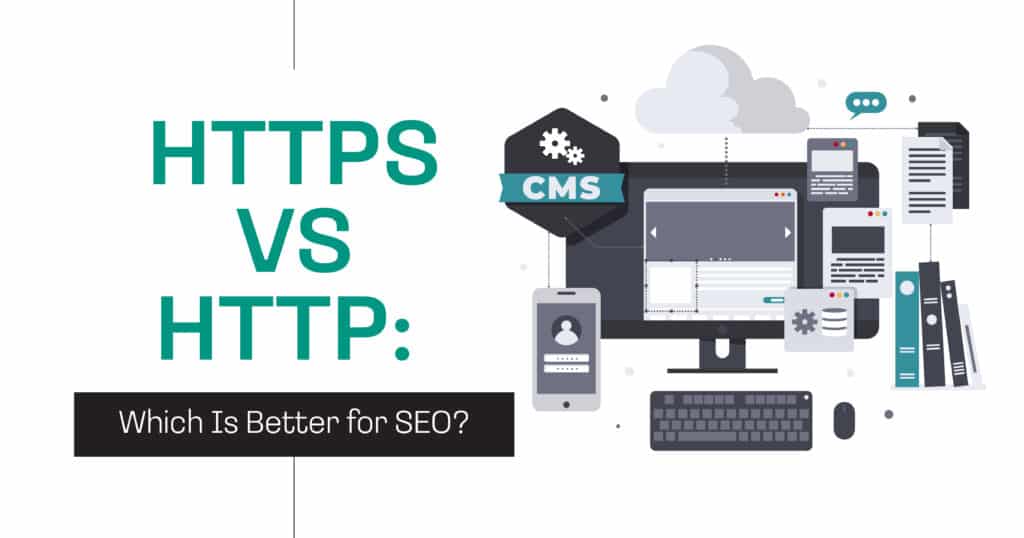Is your website secure, and does it matter for SEO?
If you’ve ever asked yourself, “HTTPS vs HTTP for SEO?” – you’re not alone. As Google continues prioritizing user experience, site security has become more than a technical upgrade – it’s now a ranking factor. Choosing HTTPS over HTTP protects your site visitors and sends trust signals to search engines that your content is safe and credible.
In this blog, we’ll explore the difference between HTTP and HTTPS, why an SSL certificate is essential in today’s digital landscape, and how switching to HTTPS can improve search rankings, build user trust, and protect sensitive data.
Understanding the Core Difference Between HTTP and HTTPS
Understanding the difference between HTTP and HTTPS is essential for website security and SEO performance. While both protocols transfer data between a user’s browser and your website, HTTPS adds a critical layer of protection: encryption. That encryption is powered by an SSL certificate, which helps establish trust with both users and search engines.
According to Cloudflare’s guide on HTTPS, HTTP lacks the security mechanisms to protect user data, making it vulnerable to attacks and interception. In contrast, HTTPS ensures an encrypted connection, protects information, and improves search engine ranking and online trust.
Here’s a breakdown of how the two differ in key areas:
- HTTP (HyperText Transfer Protocol) transmits data in plain text, making it susceptible to eavesdropping or data theft
- HTTPS (HyperText Transfer Protocol Secure) encrypts all communications using SSL/TLS, protecting user privacy and data integrity
- HTTPS is now a Google ranking factor, giving secure websites an SEO edge over unsecured ones
- Browsers like Chrome label HTTP sites as “Not Secure”, which can hurt user trust and engagement
- HTTPS supports better data protection, especially important for sites that collect personal information, passwords, or payment details
Why Search Engines Prefer Secure Websites
In today’s digital landscape, search engines prioritize user safety, and that includes sending traffic to websites that protect visitor data. When your site uses HTTPS, you’re telling search engines like Google that you care about user privacy, data protection, and site credibility. That trust directly contributes to your search engine ranking.
Google officially confirmed HTTPS as a ranking signal back in 2014, and since then, it has only grown in importance. A secure website creates a safer experience, improves bounce rates, and increases engagement – all signals that search engines monitor closely.
Here’s why secure websites are favored in search results:
- Encrypted connections protect user data from interception or tampering
- HTTPS signals trustworthiness, helping build credibility with both users and algorithms
- Google gives ranking preference to secure websites, especially in competitive niches
- Secure sites improve user retention by eliminating browser warnings like “Not Secure”
- HTTPS is essential for e-commerce and lead generation, where sensitive data is exchanged
SSL Certificates and Their Role in Data Protection
An SSL certificate (Secure Sockets Layer) is the technology that powers HTTPS. It encrypts data transmitted between your website and your visitors, making it unreadable to hackers or third parties. Without SSL, your website runs on HTTP, which transmits information in plain text, leaving user data exposed and vulnerable.
Installing an SSL certificate not only secures sensitive information like logins, credit card numbers, and contact forms – it also plays a major role in your site’s credibility and SEO performance. A secure website builds trust with both users and search engines, positioning you as a brand that takes user privacy and data protection seriously.
Enhancing Website Security and User Privacy With HTTPS
HTTPS secures your website and creates a safer, more trustworthy browsing experience. From protecting sensitive user data to increasing visitor confidence, HTTPS is a foundational step in creating a secure digital presence.
Here’s a quick comparison to illustrate how HTTPS improves both security and SEO value:
| Feature | HTTP | HTTPS |
| Data Encryption | No encryption, vulnerable to attacks | Fully encrypted with SSL/TLS |
| User Trust | “Not Secure” warning in browsers | Padlock icon + secure domain |
| SEO Ranking Signal | No ranking advantage | Google confirms it as a positive factor |
| Data Protection | Exposes personal and financial data | Protects user privacy and transactions |
| Conversion Rate Impact | Lower trust = lower conversions | Higher trust = better conversion rates |
How HTTPS Impacts Search Engine Ranking and Online Trust
The move from HTTP to HTTPS doesn’t just enhance website security – it directly impacts your search engine ranking and the level of online trust your brand builds with users. Google considers HTTPS a ranking signal, meaning secure websites are more likely to appear higher in search results compared to their unsecured counterparts. More importantly, users are far less likely to engage with sites marked as “Not Secure.”
According to Google Search Central, HTTPS helps search engines confirm a site’s integrity and user safety, and is part of their broader effort to make the web a more secure environment. That means switching to HTTPS is not just a technical upgrade – it’s a strategic SEO decision.

Here’s how HTTPS affects your visibility and trust:
- Improves search engine visibility by aligning with Google’s ranking criteria
- Displays a padlock icon and removes browser security warnings, reassuring visitors
- Boosts user confidence, especially for e-commerce and lead generation websites
- Reduces bounce rates by keeping users on your site longer and increasing session trust
- Signals professionalism and credibility, helping build long-term brand authority
- Protects sensitive information like login details, form submissions, and payment data
Transitioning From HTTP to HTTPS: What You Need to Know
Switching from HTTP to HTTPS may sound technical, but it’s an essential step for any business focused on SEO, user trust, and long-term digital credibility. The process involves installing an SSL certificate, updating internal links, and ensuring all resources (images, scripts, forms) are securely served.
Beyond the technical changes, making the switch signals to search engines that your site is aligned with modern website security standards and ready to be ranked competitively. It also gives users the peace of mind that their data is protected.
Here’s what to focus on during the transition:
- Purchase and install an SSL certificate through a trusted provider or hosting platform
- Update all internal and external links to use the HTTPS protocol
- Redirect HTTP URLs to HTTPS using 301 redirects to preserve SEO rankings
- Verify HTTPS in Google Search Console to track performance under the new protocol
- Audit your website for mixed content issues, where insecure elements break the secure experience
Secure Your Website With BloomHouse Marketing
Upgrading to HTTPS isn’t just a technical switch – it’s a strategic move that impacts SEO, trust, and long-term growth. At BloomHouse Marketing, we help businesses strengthen their digital foundations with secure, SEO-friendly websites that build user confidence and earn search engine credibility.
Ready to make your website safer, faster, and more competitive? Contact BloomHouse Marketing to secure your site and elevate your SEO strategy today.

FAQs
How does using HTTPS over HTTP improve search engine ranking and online trust with users?
HTTPS is a confirmed Google ranking signal, giving secure websites a visibility boost. It also displays security indicators like the padlock icon, which helps build trust and keeps users from bouncing due to browser warnings.
What role does an SSL certificate play in ensuring website security and fostering data protection?
An SSL certificate encrypts the data between your site and visitors, preventing interception or tampering. It safeguards personal information and supports user privacy and compliance with security standards.
Why is an encrypted connection crucial for boosting user privacy and increasing search engine ranking?
Encryption ensures sensitive data – like logins or form entries – remains private, which builds confidence with your users. Search engines reward this commitment to safety with better ranking potential.
How does transitioning to HTTPS enhance website security and build online trust?
Moving to HTTPS helps eliminate browser “Not Secure” warnings, providing a more credible and trustworthy experience for visitors. It shows users – and Google – that your site prioritizes protection and professionalism.
What can we learn from competitor analysis regarding HTTP vs. HTTPS adoption for SEO improvements?
Competitors that transitioned early to HTTPS often gained SEO traction and higher rankings. Brands that lagged faced browser penalties, reduced engagement, and missed out on security-driven trust signals.









